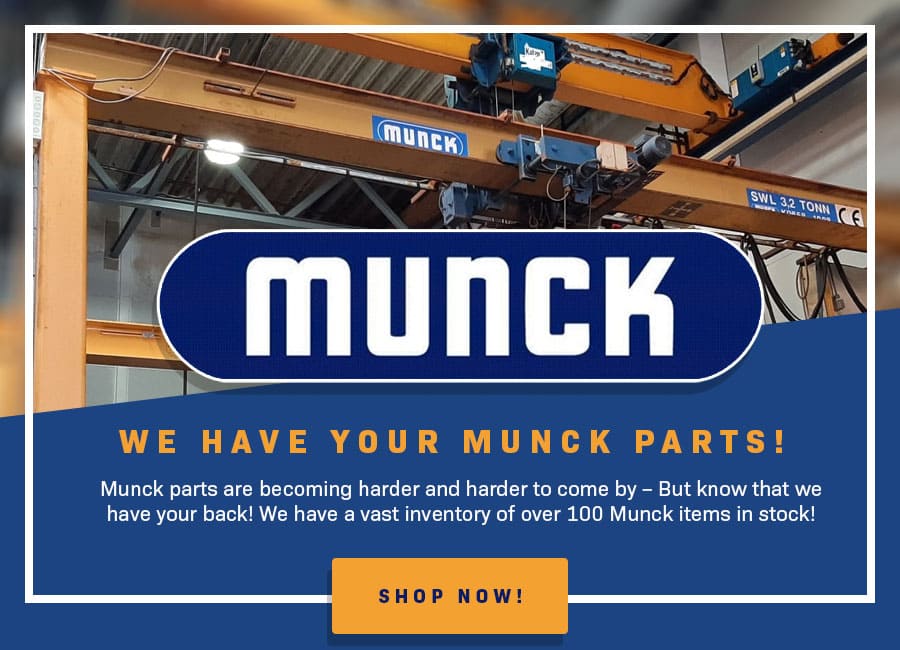CMAA Affiliation
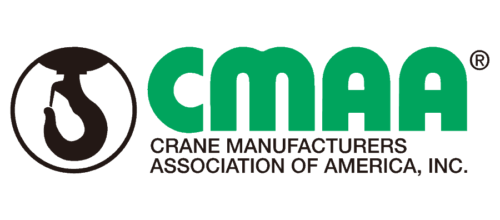 Founded in 1955, the Crane Manufacturers Association of America (CMAA) establishes the crane industry’s technical specifications, resources, and quality control standards. This helps crane buyers, architects, and engineers select equipment that promotes safety while providing exceptional quality and value.
Founded in 1955, the Crane Manufacturers Association of America (CMAA) establishes the crane industry’s technical specifications, resources, and quality control standards. This helps crane buyers, architects, and engineers select equipment that promotes safety while providing exceptional quality and value.
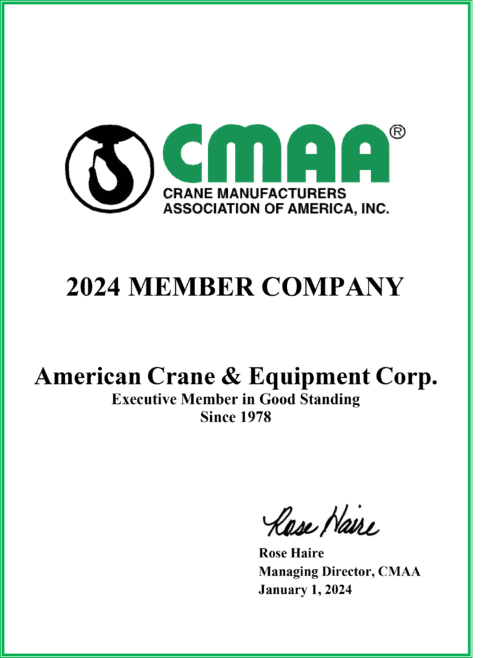
American Crane not only has an excellent reputation as a supplier of CMAA-compliant equipment and technical services but two of our executives have also been voted into leadership. Our President and CEO Karen Norheim serves as the CMAA’s president and our VP of Engineering Jeff Griesemer serves as CMAA’s Vice President of Engineering. Learn more about specific CMAA standards and the advantages of compliance.
Building to CMAA Standards
At American Crane, we are proud to manufacture products that comply with CMAA guidelines, ensuring the safe operation and longevity of the equipment. Regularly reviewing and updating industry standards means American Crane is at the forefront of providing customers with the highest quality products and services, resulting in improved construction outcomes.
Here are some CMAA technical standards for cranes:
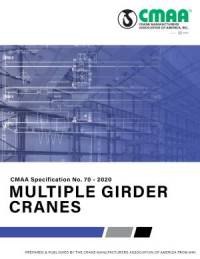
CMAA Specification 70
Specification 70 contains guidelines for top-running bridges and gantry-type multiple girder electric overhead traveling cranes. The specification was first published in 1971 and has been updated several times as crane technology has advanced.
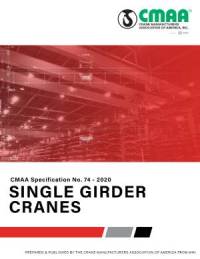
CMAA Specification 74
Specification 74 provides guidelines for under and top-running single girder electric traveling cranes. It promotes the standardization of these electric overhead traveling cranes.
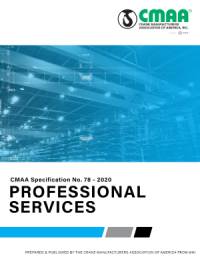
CMAA Specification 78
First published in 2014, CMAA 78 contains valuable information for crane users, engineers, and other maintenance professionals who service traveling and overhead cranes and hoisting equipment. This information helps people select the best service provider for these machines.
To purchase and download any of these specification sheets, visit MHI.org.
CMAA Crane Duty Classifications
Cranes are classified into six types, each based on its duty cycle. The classification assists clients in balancing the initial cost of a crane system with the cost of future maintenance. While the classifications by CMAA divide the cranes into six, most equipment is Class C (moderate service). American Crane supplies all classes of cranes and can also rebuild existing equipment.
CMAA Class A: Standby or Infrequent Service
This class covers cranes used in installation and infrequent maintenance applications. It’s common where there is a need for slow and accurate handling.
Typical applications include:
- Public utilities
- Power houses
- Motor rooms
- Turbine rooms
- Transformer stations
CMAA Class B: Light Service
These cranes are common in places that require light and low-speed services. Common uses include:
- Repair shops
- Light assembly operations
- Light warehousing
- Service buildings
CMAA Class C: Moderate Service
This class of cranes handles moderate loads, about 50% of the rated capacity. The cranes have a lift distance of about 15 feet and execute 5-10 lifts every hour.
Examples of Class C cranes are:
- Paper mill machine rooms
- Machine shops
CMAA Class D: Heavy Service
This service class involves high-speed, heavy-duty crane equipment that constantly handles 50-65% of its rated load capacity. The cranes have a lift distance of about 15 feet and perform 10-20 lifts every hour.
These cranes are usually found in:
- Fabricating plants
- Heavy machine shops
- Container yards
- Steel warehouses
- Lumber mills
- Foundries
CMAA Class E: Severe Service
This class includes top-riding gantry and bridge-type multiple girder overhead cranes that constantly handle loads near the rated capacity throughout their service life. They usually handle about 20 lifts per hour.
Applications include:
- Cement mills
- Lumber mills
- Fertilizer plants
- Scrap yards
- Container handling
- Magnet and bucket operations
CMAA Class F: Continuous Severe Service
These custom-designed cranes can handle loads near rated capacity under severe conditions. The cranes must be reliable enough to perform crucial tasks in production facilities under extreme conditions and must be easy to maintain. Examples of Class F cranes include those in:
- Coke handling
- Slag management
At American Crane, the majority of our product range includes single girder cranes, double girder cranes, chain hoists, gantry cranes, and jib cranes. Typical installation environments include machine shops, machine rooms, and paper mills. The average lift height is 15 feet, and the average load is 50% of each crane’s respective rated lift capacity. They can usually handle about 5 to 10 lifts per hour.
Advantages of CMAA Compliant Equipment
The CMAA collaborates with leading manufacturers to create, review, and update specifications to standardize preferred designs for crane components, integrated crane systems, and overhead traveling cranes. Engineering specifications are widely accepted as the design standards for these crane products.
For customers and crane operators, there are many benefits of CMAA compliance, such as:
- Accessibility: You can easily find the classification you require based on lift height, number of lifts, lift capacity, and installation.
- Service by certified technicians: When you need overhead equipment serviced, you can find reputable technicians that are educated and CMAA certified to provide that service.
- Standardized safety: The CMAA offers standard safety education for overhead crane users.
- Efficiency: Getting equipment that follows CMAA specifications ensures they are efficient and reliable, which maximizes production and safety while reducing downtime.
ACECO Equipment Crafted with CMAA Compliance
At American Crane & Equipment Corporation (ACECO), we know that compliance with CMAA standards is essential to meeting the modern crane industry’s safety and performance standards. That’s why we’ve built all our equipment to CMAA standards. With the knowledge of specific CMAA specifications and classifications, you can be confident that your equipment is manufactured to the highest quality and meets your application’s performance requirements.
Contact us today to learn more about our products, services, or the CMAA. Request a quote to order your crane solution.






